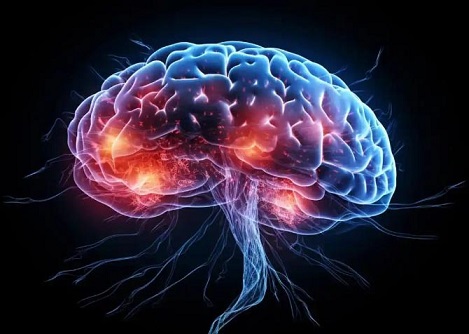Nikhil Prasad Fact checked by:Thailand Medical News Team Aug 05, 2024 1 year, 4 months, 2 weeks, 6 days, 8 hours, 13 minutes ago
Medical-News: Neuroactive steroids, a group of naturally occurring compounds in the brain, have been found to play a crucial role in various aspects of health and disease. This
Medical News report delves into the latest findings on neuroactive steroids, highlighting their significance and potential therapeutic applications. The study's findings shed light on the diverse roles of these compounds in neurological functions and their implications for treating various conditions.
 The hidden power of neuroactive steroids
What are Neuroactive Steroids?
The hidden power of neuroactive steroids
What are Neuroactive Steroids?
Neuroactive steroids are a class of steroid hormones produced in the brain and peripheral glands like the gonads and adrenal glands. They are synthesized from cholesterol through a series of enzymatic reactions, resulting in the formation of hormones such as progesterone, testosterone, and estrogen. These hormones, in turn, are converted into various metabolites, including allopregnanolone (ALLO) and isoallopregnanolone (ISOALLO).
Mechanisms of Action
Neuroactive steroids exert their effects through interactions with both classical steroid receptors and membrane-bound receptors. For instance, progesterone can bind to receptors like Sigma-1 and membrane progesterone receptors (mPRs), while ALLO interacts with the gamma-aminobutyric acid (GABA)-A receptor. These interactions regulate numerous neural functions, including memory, learning, and reproductive behavior.
Neuroactive Steroids in Health
Research has shown that neuroactive steroids are vital for various physiological processes. They play a role in memory and learning, influence myelination (the process of forming a protective sheath around nerve fibers), and regulate glial functions. These steroids also contribute to the development of neural tissue, with sex differences observed in their levels and actions. For example, studies have reported differences in the synthesis and levels of neuroactive steroids in male and female rodents, particularly during the estrous cycle.
Neuroactive Steroids in Disease
Neuroactive steroids are not only crucial for normal brain function but also offer protective effects in several neurodegenerative and psychiatric conditions. They have shown promise in treating Alzheimer's disease, Parkinson's disease, multiple sclerosis, traumatic brain injury, stroke, and peripheral neuropathies. Additionally, they have been linked to psychiatric disorders such as depression, anxiety, and post-traumatic stress disorder (PTSD).
Therapeutic Potential
The potential of neuroactive steroids as therapeutic agents is immense. For instance, ALLO, a potent GABA-A receptor ligand, has been explored for its role in postpartum depression. Another study highlighted the impact of deleting the enzyme Cyp46a1, which synthesizes 24S-hydroxycholesterol, on brain function. The deletion led to significant changes, emphasizing the importance of local steroid synthesis.
Sex Differences in Neur
oactive Steroids
Sex differences in the levels and actions of neuroactive steroids have been reported under both physiological and pathological conditions. These differences suggest potential avenues for sex-specific therapies. For example, estrogen is believed to slow the progression of Parkinson's disease, which has a higher prevalence in men. In a study of mice overexpressing the human alpha-synuclein protein, males exhibited a more significant decrease in nigrostriatal dopamine and increased microgliosis compared to females.
Protective Effects
Neuroactive steroids have shown protective effects in various animal models. In a study involving Wobbler mice, a model of amyotrophic lateral sclerosis (ALS), testosterone treatment reduced myelin abnormalities, improved motor performance, enhanced muscle mass, and increased strength. Another study found that the progesterone metabolite ISOALLO could inhibit estrus cycle-dependent aggressive behavior in rats, providing insights into conditions like premenstrual dysphoric disorder.
Neuroactive Steroids and Stress
The role of neuroactive steroids in stress responses is another area of interest. Research has shown that miRNAs targeting FKBP5, a stress-responsive gene, are significantly reduced in animal models of prenatal stress. This reduction suggests a key role for these miRNAs in sustaining the long-term effects of early-life stress.
Future Directions
The study of neuroactive steroids is a rapidly evolving field, with ongoing research exploring their roles in health and disease. Future studies are likely to focus on further elucidating the mechanisms of action of these compounds and developing targeted therapies based on sex-specific differences.
Conclusion
Neuroactive steroids represent a promising frontier in medical research, offering potential therapeutic applications for a range of neurological and psychiatric conditions. Their ability to regulate neural functions and provide protective effects in various disease models underscores their significance. As research continues, these compounds may pave the way for innovative treatments tailored to individual patient needs.
The study findings were published in the peer-reviewed journal: Biomolecules.
https://www.mdpi.com/2218-273X/14/8/941
For the latest on neuroactive steroids, keep on logging to Thailand
Medical News.
Read Also:
https://www.thailandmedical.news/news/the-healing-powers-of-astragalus-polysaccharides-in-neurodegenerative-diseases
https://www.thailandmedical.news/news/herbs-and-phytochemicals-oroxylum-indicum-extracts-boosts-brain-health-and-are-neuroprotective
